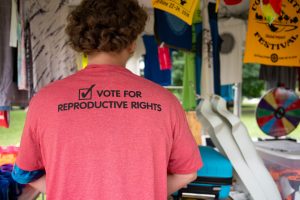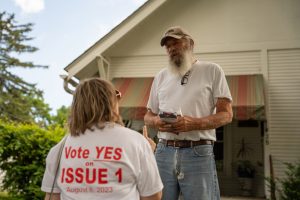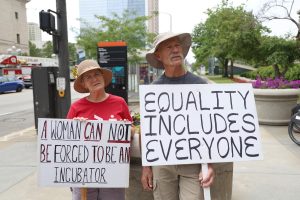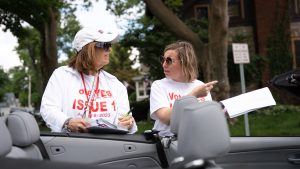- Slug: After Roe-Political Mobilization-ABRIDGED. 990 words
- Full version also available.
- 13 photos available (thumbnails and captions below).
- Video available.
By Maddy Keyes and Joshua Shimkus
News21
Editor’s Note: This story is part of “America After Roe,” a series produced by Carnegie-Knight News21 examining the impacts of the reversal of Roe v. Wade and how the monumental decision has gone beyond abortion bans and courthouse battles to more broadly affect health care, culture, policy and people.
DELAWARE, Ohio – About two dozen people crammed into a room at the local Republican Party headquarters. An “End Corruption, Vote Trump” poster hung on the wall behind a folding table displaying State Issue 1 pamphlets and a stack of anti-abortion flyers.
They gathered this June day to celebrate the first anniversary of the fall of Roe v. Wade and the undoing of federal protections for abortion rights – but also to galvanize for the next phase of their fight.
For Ohio Republicans, that means a special election on Aug. 8 that could, for the first time in 111 years, change how the citizens of this state approve amendments to the Ohio Constitution.
If State Issue 1 passes, any proposed amendment would require 60% voter approval, rather than the current simple majority of 50% plus one vote.
The political maneuvering in this state is just one example of how Americans across the political spectrum are mobilizing post-Roe, engaging in battles at the ballot box that could affect far more than abortion.
In Arizona and other states, abortion-rights activists are exploring the possibility of adding citizen-led constitutional amendments to the 2024 ballot to protect abortion access.
“It’s a bit of a test case,” said Alice Clapman, senior counsel in the voting rights program at the Brennan Center for Justice, a nonpartisan policy organization housed at New York University.
“Whether lawmakers are able to sneak through this really major change to a system that’s been in place for over a century will speak to how well our democratic norms are holding up nationally.”
‘This is our freedom’
State Issue 1 has a direct connection with the fight over abortion rights in Ohio.
On Nov. 7, Ohio voters are set to decide whether to enshrine abortion rights in the state constitution. The proposed amendment would guarantee every individual has the right to make and carry out their own reproductive decisions, including, but not limited to, decisions on contraception, fertility treatment, miscarriage care and elective abortion.
If State Issue 1 passes, far more votes will be needed to approve the so-called Right to Reproductive Freedom amendment in November.
Jen Miller, executive director of the League of Women Voters of Ohio, called the August election an obvious attempt to block the abortion amendment.
“It’s absolutely no coincidence,” she said. “But it’s beyond that. It’s more than one issue. It’s more than one election. This is about our ability as everyday Ohioans to pass policies that improve our daily lives. This is our freedom that we must protect.”
Supporters of State Issue 1 insist constitutional amendments should require a supermajority to pass.
Amy Natoce, a spokeswoman for the anti-abortion group Protect Women Ohio, called the measure a “common sense protection” against “out-of-state special interests … who think they can fly into Ohio … and circumvent our Legislature to buy their way into the constitution.”
Yet Issue 1 itself has received support from Richard Uihlein, a conservative billionaire from Illinois. According to The Columbus Dispatch, Uihlein gave around $1.1 million to a political action committee that pushed ads urging lawmakers to back Issue 1.
David Pepper, former chair of the Ohio Democratic Party, characterized the Republican messaging as disinformation.
“All of it is to fool voters into doing something which voters never normally do,” he said, “take power away from themselves and give it to politicians.”
A national trend
Some states have tried for years to make it harder to pass constitutional amendments. Post-Roe, efforts have been renewed as anti-abortion advocates look for ways to counter proposed measures to protect abortion rights.
In Arkansas, a new law requires signatures from 50 counties, instead of 15, for an initiative to qualify for the ballot. North Dakota lawmakers also approved a proposal to increase the number of signatures required to put an amendment on the ballot; the measure goes to voters in 2024.
Florida, Missouri, Idaho and Oklahoma also tried, unsuccessfully, to change the initiative process.
Arizona added hurdles to the initiative process last year. In November, voters approved Propositions 129 and 132. The first limits ballot initiatives to a single subject, while the second requires 60% voter approval for new taxes. Voters rejected a third measure to allow legislators to change voter-approved measures under certain circumstances.
“Ohio’s just the first example of a few places where legislators are nervous about using ballots to change state constitutions to protect reproductive rights,” said Rachel Rebouché, dean of the Temple University’s Beasley School of Law and an expert in reproductive health law. “Their solution is just to change how ballot measures operate.”
Ballot initiatives are an important measure of how people feel on something specific like abortion, because they “decouple” issues from party politics, Rebouché said. Research shows they also remain popular with citizens.
“Ohio has been, since 1912, a shining example of direct democracy where Ohio voters can pass policies when politicians fail us,” said Miller, of the state’s League of Women Voters. “That’s the example we should be for the country. And that’s why Ohioans need to show up and vote ‘no’ in droves, so that no other state gets this idea.”
A fight for every vote
On the weekend of the first anniversary of the reversal of Roe, volunteers on both sides of the abortion debate hit the ground in Ohio with one common goal: Get people to the ballot box.
At a community festival in Columbus, a volunteer working on behalf of the abortion amendment shouted over the thrum of music to ask passersby the same question again and again: “Anybody want to sign the petition to legalize abortion?”
With just a few hours left at the festival, volunteers in pink shirts with “Vote for Reproductive Rights” across the back wove through the crowd with clipboards and pens. It was the final push to collect signatures to put the “Reproductive Freedom” amendment on the Nov. 7 ballot.
Some 30 miles due north, back in the city of Delaware, anti-abortion advocates prepared their speeches as they went door to door to advocate for State Issue 1.
For more than two hours on a sunny afternoon, Kristine Wolfe, a Delaware County precinct committeewoman, knocked on doors and passed out pamphlets.
She said it was her passion for protecting human life and an old saying that kept her going:
“If you don’t wear out the soles of your shoes during a campaign cycle, you’re not working hard enough.”
News21 reporter Mingson Lau contributed to this report.




by Maddy Keyes/ News21)








